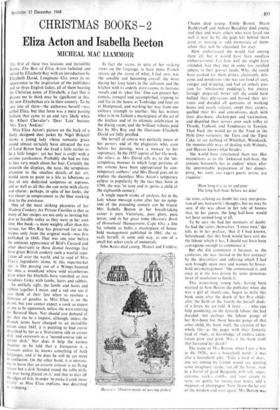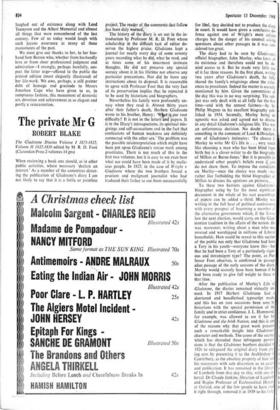Eliza Acton and Isabella Beeton CHRISTMAS BOOKS - 2
MICHEAL MAC LIAMMOIR
The first of these two luscious and incredible books, The Best of Eliza Acton (selected and edited by Elizabeth Ray with an introduction by Elizabeth David, Longmans 42s), owes its re- appearance to the inspiration of the publishers and to three English ladies, all of them bearing the Christian name of Elizabeth, a fact that it pleases me to think may be significant in this, the new Elizabethan era in their country. To be sure one of them—the authoress herself—was called Eliza, but that form was a mere passing fashion that came to an end very likely when Mr Albert Chevalier's 'Dear 'Liza' became 'Mrs 'Enry 'Awkins.'
Miss Eliza Acton's picture on the back of a finely designed dust jacket by Nigel Birknell shows a young lady whose romantic grace would almost certainly have attracted the eye of Lord Byron had she lived a little earlier or he a little longer: yet her hair is coiffe with a curious carelessness. Probably she had no time to fuss very much about her hair. Certainly the research she displays, the taste, the scrupulous attention to the smallest details of her art, would seem to point to a life as laborious as that of any dedicated sculptress or soprano, and as well as all this she can write with clarity and charm: perhaps, in spite of her looks, she was closer in temperament to the blue stocking than to the precieuse.
One of the most striking pleasures of her Modern Cookery for Private Families is that so many of her recipes are not only as inviting but also as feasible today as they were in her own time. Her book—a more weighty affair than this reissue, for Mrs Ray has preserved for us the recipes only from the original work—was first published in 1845. That was one year before the ominous appearance of Bird's Custard and other short-cuts to those dismal feastings that have given British cookery such a woeful repu- tation all over the world, and to read of Miss Eliza's ingredients alone, in this supermarket age, is like passing out of a Wimpy-haunted bar into a woodland where wild strawberries grow when the bluebells have vanished, or into meadows frisky with lambs, hares and rabbits.
An unlikely sight, the lambs and hares and rabbits together I mean, and a sad one too if you think of their fate when so resolute a huntress of goodies as Miss Eliza is on the prowl, but you cannot expect a cook as expert as she to be squeamish, unless she were catering for Bernard Shaw. Nor should you demand of her that she be a linguist, although, unless the French terms have changed to an incredible extent since 1845, it is puzzling to find entrée described by her as a 'first-course side or corner dish' and entremets as a 'second-course side or corner dish.' Nor does it help the earnest inquirer to be told that a blanquette is a fricassee unless he knows something of both languages, and if he does he will be yet more in confusion. On the other hand, it is entranc- ing to learn that an assiette volatile is no flying saucer but a dish 'handed round the table with- out ever being placed on it,' and that to slice off the edges of fish, in-order `to make it cook more Crisply' as Miss Eliza explains, was described a -crimping.' In fact she seems, in spite of her striking views on the language, to have many French secrets up the sleeve of what, I feel sure, was the sensible and becoming overall she wore during her long hours in the stillroom and the kitchen with its orderly store-rooms, its lustrous vessels and its 'clear fire.' One can picture her, comely, tranquil and accomplished, tripping to and fro in the house at Tonbridge and later on at Hampstead, and working her way from one culinary triumph to another. She has written what is in it fashion a masterpiece of the art of the kitchen and of its ultimate celebration in the dining room, and the brilliant tributes paid her by Mrs Ray and the illustrious Elizabeth David are fully justified.
She herself of course was perfectly aware of her powers and of the plagiarists who, even before her passing, were a menace to her supremacy. In the 1855 reprint of her life-work, she refers, as Mrs David tells us, to the 'un- scrupulous manner in which large portions of my volume have been appropriated by con- temporary authors,' and Mrs David goes on to explain the dauntless Miss Acton's temporary eclipse in popularity by the fact that, born in 1799, she was 'in taste and in spirits a child of the eighteenth century.'
A single superb stroke of analysis, for in the lady whose message came after her no symp- tom of the preceding century can be traced. Mrs Isabella Beeton in her breath-taking career is pure Victoriana, pure glory, pure terror, and in her great tome (Beeton's Book of Household Management, Cape 63s). a fine fat volume as befits a masterpiece of house- hold management published in 1861, she re- veals herself, in some odd way, as one of a small but select circle of immortals.
John Keats died young; Mozart and Freddric
Beeton's 'Modern mode of serving dishes'
Chopin died young; Emily Brontë, Marie Bashkirtseff and Aubrey Beardsley died young,
and they and many others who were loved too well it may be by the gods left behind them great or moving or odd memorials of them- selves that will be cherished for ever.
How embarrassed she would feel among them all: but it would have been needless embarrassment. For how well she might have attended, had they met in some less rarefied sphere. to their grosser needs. Why, she could have cooked for them dishes, alternately deli- cious and ponderous (she was too fond of suet, vinegar and dripping, and had an unholy pas- sion for 'wholesome puddings'), but always lovingly prepared: better still she could have bullied their physicians and bossed their ser- vants and decided all questions of working hours and yearly salaries; swept their carpets, quelled their fits and convulsions, dealt with their diarrhoea, chicken-pox and vaccination. and dispelled their terrors over such trifles as Thrush, Typhoid, and Tendencies to Tension. Then back she would go to the Toad in the Hole (two varieties), the Tarts and the Tipsy Cake, to say nothing of Whitebait, Woodcock, the innumerable ways of dealing with Walnuts, and Heaven knows what besides.
She would have entertained them too. Her instructions as to the 'awkward half-hour the anxious housewife has to endure' when, after the interminable preparation of her dinner- party, her (only too eager) guests arrive, are exquisite: 'How long it is to sit and pine The long half-hour before we dine' she cries, echoing no doubt her own interpreta- tion of any housewife's thoughts; but we may be sure, if she was about in her role of hostess that, to her guests, the long half-hour would not have seemed long at all.
To be sure she had her moments of doubt. So had the saints themselves. 'I must own,' she tells us in her preface, 'that if I had known, beforehand, that this book would have cost me the labour which it has, I should not have been courageous enough to commence it.'
But she did commence it because, as she confesses, she was 'moved in the first instance' by the 'discomfort and suffering which I had seen brought upon men and women by house- hold mis-management.' She commenced it, and once at it she was driven by some demoniac fever of resolution to finish it.
This astonishing young lady, having been married to Sam Beeton the publisher when she was a girl of twenty-one, began to write this book soon after the death of her first child: after the birth of the fourth she herself died: of a fever, we are told. A fever . . . who can help pondering on the feverish labour she had dreaded--not perhaps the labour pangs of her first-born but those heavier pangs of that other child, the book itself, the creation of her whole life—as the pages with their fantastic load of study, of knowledge, of endless calcu- lation grew and grew. Was it the book itself that hastened her death?
The name of Mrs Berton, when I was a boy in the 1920s, was a household word : it was also a household joke. 'Take a herd of deer, one wit among my friends would say, quoting some imaginary recipe, 'cut,off the horns, stew in a barrel of good Burgundy with salt, sugar, cayenne. cock's combs, and sour cream to taste, stir gently for twenty-four hours, add a magnum of champagne. Now throw the lot out of the window and start again.' Mrs Beeton was
laughed out of existence along with Lord Tennyson and the Albert Memorial and.ahhost all things that were remembered of the last century. Few of us today would laugh with such joyous assurance at many of these monuments of the past.
We must give our thanks to her, to her hus- band Sam Beeton who, whether from husbandly love or from sheer professional judgment and admiration—I strongly, perhaps hatefully, sus- pect the latter urge—offered to the public the printed edition (most elegantly illustrated) of her life-work. We owe, perhaps, a still greater debt of homage and gratitude to Messrs Jonathan Cape who have given to us, in sumptuous fashion, this monument of domestic art, devotion and achievement in so elegant and portly a reincarnation.















































 Previous page
Previous page